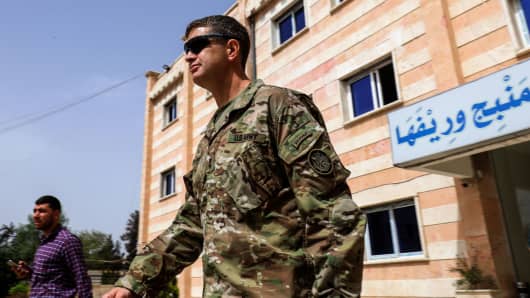Rather than force the countries most directly threatened by ISIS to defend their own territory while using our intelligence, surveillance, and reconnaissance assets to guard against any threat to U.S. personnel or interests, Washington expended precious resources that could have otherwise been spent on improved readiness, modernization, or other higher-valued purposes.
Billions of dollars and the lives of numerous American service members could have been saved had we never deployed there without risking the safety of Americans.
The question today, however, is what about U.S. policy going forward? Should the U.S. embark on an endless nation-building campaign in Syria—to prevent various factions in the Middle East from fighting each other—or should we instead focus on eliminating direct threats to America?
My experience, and the outcomes of our post-9/11 foreign policy, overwhelmingly confirms the president's instincts.
First, we must disabuse ourselves of the notion that a handful of U.S. troops in the vast domain of the fragmented Syria—still racked by a multi-sided civil war with regional and major powers backing various groups—has even the theoretical possibility of preventing any faction, from doing anything, over any time frame.
I observed firsthand in 2011 how 140,000 US and NATO troops, backed up by 300,000 Afghan security forces, proved incapable of denying the Taliban access to vast tracts of the country.
Aside from the fact it is militarily impossible to accomplish the laundry-list of goals in Syria—"countering" Iran (which can't even be defined), opposing Assad (which isn't necessary for U.S. security), and stopping Turkey from attacking Syrian Kurds (risking confrontation with our NATO ally).
It is not in America's interests to stay in Syria for objectives so disconnected from our security and prosperity. Contrary to conventional wisdom in Washington, the strategic benefit doesn't come anywhere close to justifying the cost.
Syria remains embroiled in a civil war with scores of groups and militias trying to attain various and competing objectives. The remaining fight there belongs to them, not the United States.
Many fear that a U.S. withdrawal from Syria would hand a victory to Russia. That concern is also misplaced. Russia has an enduring interest in Syria in holding on to their sole Middle East warm water port at Tartus.
So long as Assad stays in power, they will continue to hold it, quite irrespective of whether the U.S. remains or withdraws. What Russia "wins" by the departure of U.S. troops, however, is becoming the primary owner of the Syrian disaster and all the strategic costs that come with it. American power throughout the Middle East remains robust and undiminished, and will continue to dwarf that of Russia even after the small contingent of U.S. troops has returned home.
American security is neither enhanced nor placed at increased risk regardless of how the Syrian war is eventually resolved. Our government's obligation to defend U.S. interests and citizens remains the same either way, and we will continue to successfully protect our vital national interests.
Leaving a residual military force indefinitely on the ground in Syria will not accomplish even partial success, and that's okay, as long as we get out and stop risking precious blood and treasure. President Trump is right to order the withdrawal of American troops from Syria.
Commentary by Daniel L. Davis, a senior fellow for Defense Priorities and a former Lt. Col. in the U.S. Army who retired in 2015 after 21 years, including four combat deployments. Follow him on Twitter @DanielLDavis1.
For more insight from CNBC contributors, follow
@CNBCopinion
on Twitter.





